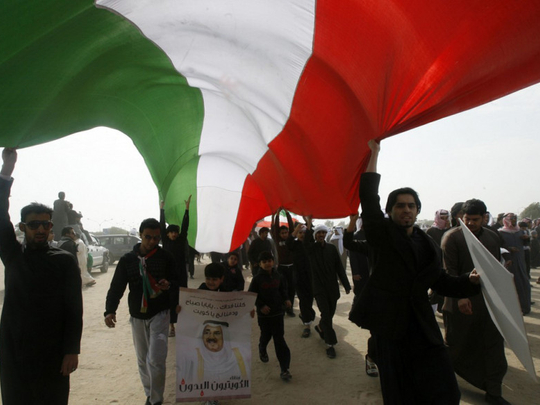
Manama: Kuwaiti authorities on Saturday said 7,243 illegal residents, a term used to refer to stateless people staying in the country, have regularised their status in the country since 2011 and up to October 15.
Mohammad Al Wuhaib, the director of the agency for status adjustment at the Central Apparatus for Illegal Residents’ Affairs, said that the illegal residents have adjusted their status and reverted back to their Saudi, Iraqi, Iranian, Jordanian and other nationalities.
“All illegal residents who are yet to adjust their status in the country are advised to visit the headquarters of the central apparatus to take the necessary measures,” he said.
Al Wuhaib said that those complying with the law will be given residency visas that could be renewed every five years in addition to health care, education and ration card, Kuwait News Agency (Kuna) reported.
Other privileges such as priority in employment after Kuwaiti nationals and the facilitation of procedures for obtaining driver licences will also apply upon adjustment of their status, he added.
In September, the authorities said 7,039 people living illegally in Kuwait had adjusted their status up to August 2015 by declaring their original nationalities.
According to figures released then, 4,973 residents regularised their status by announcing their Saudi nationality, 778 Iraqi nationality, 726 Syrian nationality, 79 Iranian nationality, 47 Jordanian nationality and 436 other nationalities.
Kuwait, which formerly referred to the stateless as “bidoon”, now classifies them as “illegal residents”.
Kuwait has been looking into ways to address the issue of the approximately 105,000 stateless residents who have been seeking Kuwaiti citizenship as well as civil and social rights.
However, the government said that only 34,000 qualified for consideration while the rest were Arabs or descendants of Arab people who moved to Kuwait following the discovery of oil and deliberately got rid of their original passports to seek citizenship in the oil-rich country, Kuwaiti media reported.
In 2010, in a new effort to find a solution to the issue and determine those who deserved the citizenship — including residents whose stateless parents failed to register for citizenship following independence in 1961 — Kuwait set up the Central Apparatus for Illegal Residents.
The agency provides a package of incentives to illegal residents who adjust their legal status and declare their original nationalities.
Benefits include granting all family members a renewable five-year residency permit with no fees incurred, free-of-charge education and health services, supply cards, and priority recruitment after Kuwaiti nationals in public agencies and bodies and smoother procedures for driving licences, Kuna said.
In 2014, a plan to offer stateless people citizenship of the African nation of Comoros to help settle the social, economic and political issue was criticised by lawmakers.
Under the plan, the illegal residents obtain the economic citizenship of the Comoros islands that would give them the rights to reside in Kuwait under Article 22 (self-sponsorship), to free education and health care, and to employment.
Family heads would receive a passport and nationality, while the children would be given original Comoran nationalities and passports, he added.
According to the accord, Kuwait will fulfil the Comoran condition to build schools, institutes and houses on the islands and open a branch of the Zakat House.
Kuwait would not deport any naturalised Comoran without a court order. The deported would have the rights to housing, health care and education provided by the Kuwaiti government.












